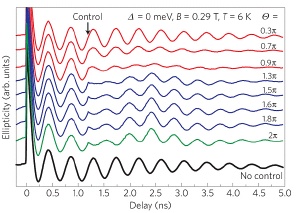Mar 28 2009
The intrinsic rotation of electrons - the "spin" - remains unused by modern electronics. If use as an information carrier were possible, the processing power of electronic components would suddenly increase to a multiple of the present capacity. In cooperation with colleagues from Dortmuand, St. Petersburg and Washington, Bochum physicists have now succeeded in aligning electron spin, bringing it to a controlled "waver" and reading it out.
 The diagrams show how the spin wavers (oscillation shown at top) in relation to time following an alignment laser pulse.
The diagrams show how the spin wavers (oscillation shown at top) in relation to time following an alignment laser pulse.
The electron spin can also be realigned as required at any time using optical pulses. "This is the first, important step toward addressing these "quantum bits", which will form an integral part of data transfer systems and processors in the future", exclaimed Prof. Andreas Wieck. The researchers have published their report in NATURE Physics.
Complex Calculations in Minimum Space
The entirety of present day electronics is based on electrical charges: If a memory cell (bit) has an electrical charge, it represents a logical "1", if no charge is present this is a logical "0". However electrons have more than just a charge - they spin like a top around their own axis, producing a magnetic field, similar to the earth. This spin can be accelerated or decelerated by applying an external magnetic field. The "top" begins to waver and its axis tips to virtually any desired angle. If these manifold possibilities were used as information carriers, it would be possible to store a great deal more information than just "0" and "1" with an electron. Moreover adjacent electrons could be moved into various configurations, because they exert forces on one another in the same manner as two magnets on a bulletin board. This phenomenon would provide a significantly more complex base for data storage and processing. Even a small quantity of these so-call quantum bits (qubits), would allow extremely complex calculations, for which millions of bits are required today.
Confinement of Spins in Indium-Arsenic Islands
Naturally one single electron has only a very small measureable effect. For this reason individual electron measurements can only be performed with great difficulty using highly sensitive instruments. This is why the international research team has specialized in confining nearly one million electrons each in virtually identical indium-arsenic islands ("quantum dots") and totaling their effect. These "ensemble" measurements provide signals which are stronger by a magnitude of six, making them very sturdy and allowing them to be recorded easily. "Contrary to the preconceptions of many international competitors, all associated electron spins exhibit precisely the same behavior and the microscopic effects can therefore be measured very easily" stated Wieck.
Optical Switching of Quantum Dots
In the study published in "NATURE" the physicists were not only successful in aligning the electron spin; they also managed to rotate it optically using a laser pulse in any desired direction at any time and read this direction out with a further laser pulse. This is the first important step towards "addressing" and influencing qubits. "The interesting factor here is that these electrons are enclosed in solid bodies, so we no longer need complex high vacuum equipment and light occlusion on all sides to keep them permanently in a module as in quantum optics " stressed Prof. Wieck. In Bochum the extremely high vacuum is required only once during production of the quantum dot; after that the semiconductor system is sealed against air ingress, has a long service life and is just as reliable as all transistors and memory cells already in use today.